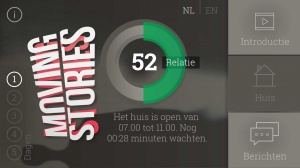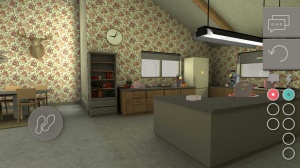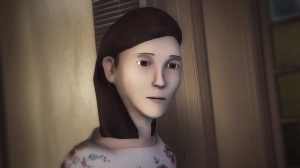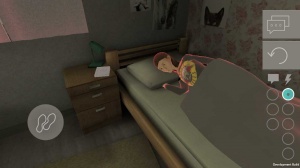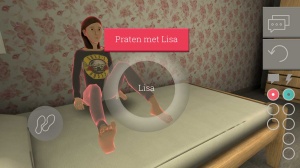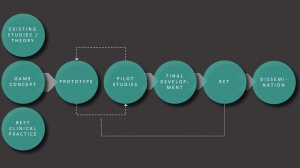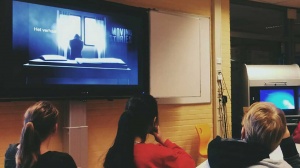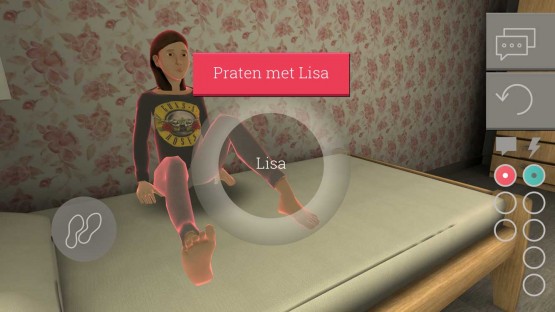about the game
LEARN CONVERSATION STRATEGIES TO USE WHEN A FRIEND IS STRUGGLING WITH DEPRESSION
Moving Stories was designed by IJsfontein, in collaboration with the Trimbos-Institute and GEMH Lab. Moving Stories is a game-based school program that consists of a single-player, mobile, 3D video game and a contact session with someone who has lived experience with a depressive disorder.
An entire secondary school class plays the game at the same time. Students each interact in the game with Lisa, who is showing signs of a depression. They are asked to help Lisa and they receive feedback from her during the day.
The game inspires students to discuss game strategies in the classroom and with that conversations about depression. In the contact session the story of Lisa is brought to life by someone with lived experience. In a classroom setting, students discuss their experiences with the game and what strategies they could use in real-life when their friend is struggling with a depression.


Related Publications
-
A game-based school program for mental health literacy and stigma on depression (Moving Stories): Cluster randomized controlled trial
Tuijnman, A., Kleinjan, M., Olthof, M., Hoogendoorn, E., Granic, I., & Engels, R. C. (2022). A Game-Based School Program for Mental Health Literacy and Stigma on Depression (Moving Stories): Cluster Randomized Controlled Trial. JMIR Mental Health, 9(8), e26615. https://doi.org/10.2196/26615
Author: Anouk Tuijnman
Upload date: 08-17-2022
-
Developing and testing social video games for adolescent depression [Doctoral Dissertation]
A. Tuijnman (2023). Developing and testing social video games for adolescent depression. Doctoral Thesis. Radboud University.
Author: Anouk Tuijnman
Upload date: 11-28-2023
-
A game-based assessment of the effects of rejection on young adults.
Tuijnman, A., Kleinjan, M., Chen, S., Engels, R. C., & Granic, I. (2021). A game-based assessment of the effects of rejection on young adults. Proceedings of the ACM on Human-Computer Interaction, 5(CHI PLAY), 1-27. https://doi.org/10.1145/3474681
Author: Anouk Tuijnman
Upload date: 10-06-2021
-
A Game-Based School Program for Mental Health Literacy and Stigma Regarding Depression (Moving Stories): Protocol for a Randomized Controlled Trial
Tuijnman, A., Kleinjan, M., Hoogendoorn, E., Granic, I. & Engels, R.C. (2019). JMIR Research Protocols, 8(3):e11255, doi: 10.2196/11255
Author: Anouk Tuijnman
Upload date: 03-14-2019
-
Developing and Testing ScrollQuest: A Video Game Targeting Rejection Sensitivity in Adolescents
Tuijnman, A., Granic, I., Whitkin, J., & Engels, R. C. M. E. (2017). In CHI PLAY'17 Extended Abstracts: Extended Abstracts Publication of the Annual Symposium on Computer-Human Interaction in Play (pp. 213-221). New York, NY: ACM.
Author: Anouk Tuijnman
Upload date: 10-15-2017
-
Current Opportunities in Research and Development of Games for Mental Health
Tuijnman, A. & Weerdmeester, J. (2017). CHI PLAY, October 15 - 18, 2017, Amsterdam.
Author: Anouk Tuijnman
Upload date: 10-15-2017
-
The Sims: A Social Improvement Mechanism for Adolescents
Lobel, A., Engels, R., Tuijnman, A., de Valk, T., & Granic, I. (2013, April). Poster presented at the biennial meeting of the Society for Research in Child Development, Seattle, WA.
Author: Adam Lobel
Upload date: 04-15-2013



